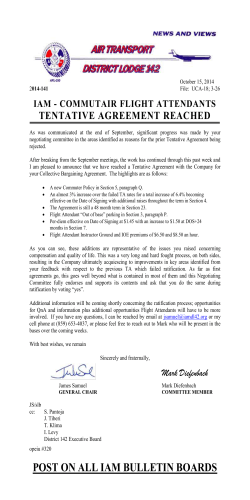
tacit ratification: a title attorney`s best friend
Title Insurance Litigation Committee Newsletter Spring 2015 TACIT RATIFICATION: A TITLE ATTORNEY’S BEST FRIEND By: Natalie Don Tarnosky Natalie Don Tarnosky is an attorney practicing in the Lafayette, Louisiana office of Galloway, Johnson, Tompkins, Burr & Smith. Licensed to practice law in both Texas and Louisiana, her practice areas include Property Insurance, Banking, Corporate Transactions and Title Resolution. She can be reached at: e-mail - [email protected]; Telephone: (337) 735-1760. Picture a man walking into his local bank. He or act of sale? Luckily, many states allow lenders to approaches the teller and asks to apply for a home loan. enforce their interest in property based on the nonThe teller smiles politely and directs the man’s attention concurring party’s “tacit ratification” of the obligation. to one of the bank’s lending agents sitting in the corner of In Louisiana, this theory has actually been codified the room. After several weeks of paperwork and phone into law.2 The Louisiana Civil Code provides that tacit calls, the man finally purchases the home of his dreams. ratification results when a person, with knowledge of an For years, he submits his monthly mortgage payment to obligation incurred on his behalf by another, accepts the the bank and all is right in the world. Now imagine that benefit of that obligation.3 Although it is not specifically those payments suddenly stop. The bank sends notice discussed within the Code after notice, but the man is itself, tacit ratification never heard from again. So At the core of the theory of tacit ratification is the requires that the intention to the bank begins the process idea that it would be unfair to allow a party to ratify be shown through the accept the benefit of a transaction with one hand, of foreclosing on his home. acts of the ratifying party.4 but later avoid their counter-obligation under the They pay an attorney to draft Thus, tacit ratification contract with the other. the pleadings, a sheriff to requires both knowledge of serve the notices, and a local the act to be ratified and an paper to advertise the sale. But before the sale can take intent to ratify that act, although intent may be inferred place, a defect in title is discovered. As it turns out, the from the underlying circumstances, including the party’s man was married and for whatever reason, the mortgage failure to object after becoming aware of the transaction.5 fails to mention that fact. Worst of all, the wife failed For example, in Zeller v. Webre, a husband and wife to execute or otherwise concur in the mortgage. Since attempted to invalidate a “rent to own” agreement to sell this is a community property state and the property was purchased during the couple’s marriage, the wife owns community real estate based on the fact that the wife a half unencumbered interest in the home.1 What is the did not sign the agreement.6 Both the Fifth Circuit and the trial court rejected the couple’s argument, finding bank to do? that the wife had tacitly ratified the agreement since she Most title attorneys have encountered this situation acknowledged that she knew of the agreement but failed in one form or another and unfortunately, it is not limited to raise any objections for fourteen years after it was to community property states. The failure of a necessary signed. Furthermore, evidence at trial revealed that the party to concur in the alienation of immovable property wife had personally received 38 “rent” payments over can arise from almost limitless scenarios, whether it be the term of the agreement, thus receiving a benefit from like the situation described above or simply a co-owner the transaction that she now sought to challenge. attempting to sell property without the agreement of his Likewise, in First Federal Sav. & Loan Ass’n of fellow co-owners. Certainly, the non-concurring party can always agree to the transaction after it occurs, but Warner Robins, Ga. v. Delta Towers, Ltd., a wife accepted what if that is not an option? What if they refuse to budge the benefit of an act of subordination of a vendor’s lien and all you are left with is a relatively null mortgage Continued on page 11 1 LSA-C.C. Art. 2338. 2 LSA-C.C. Art. 1843. 3 Id. 4 Myles v. Gen. Motors Acceptance Corp., No. CIV. A. 97-2030, 1998 WL 299958, at 7 (E.D. La. June 4, 1998); Nationwide Fin. Co. of Gretna, Inc. v. Pitre, 243 So.2d 326, 328 (La.Ct.App.1971). 5 Zeller v. Webre, 17 So. 3d 55 (La. Ct. App. 5th Cir. 2009). 6 Id. 5 5 Title Insurance Litigation Committee Newsletter TACIT RATIFICATION:... Continued from page 5 and mortgage, which was signed by her husband alone.7 In this case, the subordination allowed the couple to take advantage of certain tax benefits. Both the Fourth Circuit and the lower court agreed that the wife ratified the subordination by signing the couple’s joint tax returns since it allowed her to benefit from considerable tax breaks attributable to the subordination. Spring 2015 Thus, she ratified the mortgage through her actions. If we consider the fact that she lived on the property for several years without challenging the validity of the mortgage, this argument grows even stronger. At the core of the theory of tacit ratification is the idea that it would be unfair to allow a party to accept the benefit of a transaction with one hand, but later avoid their counter-obligation under the contract with the other.8 This notion of fairness is discussed at great length in the court’s holding in Garrett v. Walker. There, the court found that a husband ratified his wife’s mortgage of community property by filing suit years later, claiming ownership of half the property. In this case, the husband had not consented to either the purchase of the property, or to the granting of a mortgage encumbering the same. Later, when the wife attempted to sell the land, the husband filed a quiet title action, claiming an undivided one-half interest since the property was purchased during the couple’s marriage. While seeking to benefit from the purchase, the husband denied his share of any indebtedness for the purchase price. The Third Circuit held that to grant the husband’s request would “undermine the whole concept of ratification” since the husband would be allowed to reap the benefits of property ownership without being responsible for the mortgage payments. Although the theory of tacit ratification is generally recognized and accepted in most jurisdictions, a finding of ratification is extremely fact-intensive and will depend on the particular circumstances of each case. Thus, it is the title attorney’s job to carefully examine the non-concurring party’s actions both before and after the transaction to determine what facts best demonstrate that party’s knowledge and acquiescence of the obligation. One example might be found in a situation where the non-concurring party signed an agreement in the capacity of a witness.9 Although not technically consenting to the agreement, their signature on the face of the document shows knowledge of its existence and an intention not to object to the transaction. In fact, in Louisiana, spouses whose signatures appear in a juridical act are estopped from contesting the statements made by the other spouse in that act.10 Another example could result from the non-concurring party’s signature appearing on a separate document that references the original transaction. For example, in Tri-State Bank and Trust v. Moore, the Second Circuit held that a wife tacitly ratified her husband’s mortgage when several years later, she executed an act of sale that referred to the earlier mortgage.11 Yet another example might be found where a spouse or a co-owner personally makes payments on a relatively null mortgage since this would evidence both knowledge of the act and the non-concurring party’s willingness to accept the validity of the encumbrance. Applying the rationale set forth in Garrett, it is easy to see how an argument for ratification forms from the fact scenario outlined at the beginning of this article. In that example, the home loan obtained by the man was used to purchase the couple’s home. Even though the wife did not sign the mortgage, or otherwise concur in the encumbrance of the property, she accepted the benefit of the loan which financed the purchase of the property on which she lived with her husband for a number of years. For all the reasons outlined above, tacit ratification remains an essential tool in the title attorney’s belt. If the facts permit, this theory can allow a procedurally defective act to be enforceable even after being challenged by the non-concurring party. Any title practitioner would be well served by examining what conduct constitutes ratification within their own jurisdiction, since they are likely to face a relatively null document at least once during their practice. 7 First Federal Sav. & Loan Ass’n of Warner Robins, Ga. v. Delta Towers, Ltd., 544 So. 2d 1331, 1344, writ denied 548 So. 2d 1250 (La. Ct. App. 4th Cir. 1989). 8 Garrett v. Walker, 407 So. 2d 1309, 1313 (La. Ct. App. 3d Cir. 1981). 9 Kee v. Francis Camel Const., 532 So. 2d 378, 379 (La. Ct. App. 3d Cir. 1988) 10 See La. Civ. Code art. 2342. 11 Tri-State Bank and Trust v. Moore, 609 So. 2d 1091 (La. Ct. App. 2d Cir. 1992). 11 11
© Copyright 2026









